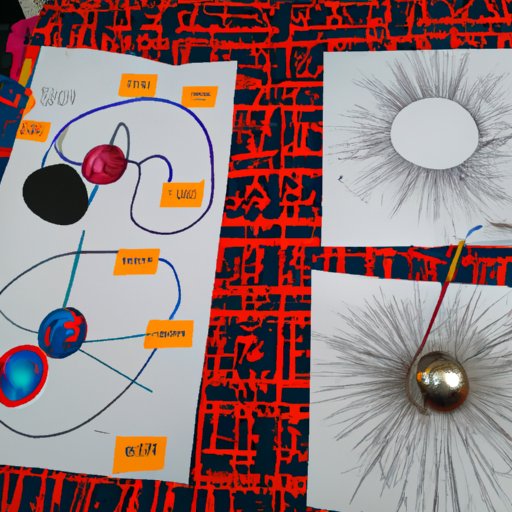Introduction
Every science fair project requires an abstract – a brief summary of the project’s purpose, goals, and findings. But what exactly is an abstract for a science fair project? And why is it so important? In this article, we will explore the basics of what an abstract is for a science fair project and understand its role in a successful project. We will also look at how to craft an effective abstract that will make your project stand out.
Exploring the Basics: What is an Abstract for a Science Fair Project?
An abstract is a concise summary of the main points of a scientific project or paper. According to the American Psychological Association (APA), it is “a brief, comprehensive summary of the contents of a paper” that allows the reader to quickly gain an understanding of the project without having to read the entire paper. It typically consists of one paragraph, about 250 words long, that outlines the key points of the project.
The purpose of an abstract is to provide readers with a clear and concise overview of the project. It should include the project’s objective, method, results, and conclusion. By reading the abstract, readers should be able to get a good understanding of the project without having to read the entire paper. This makes it easier for readers to quickly identify projects that are relevant to their research.
When writing an abstract for a science fair project, there are certain formatting requirements that must be followed. This includes using the appropriate font size, margins, and spacing. Additionally, the abstract should be written in the third person and use active voice. Finally, make sure to proofread the abstract for any errors or typos before submitting it.

Understanding the Role of an Abstract in a Science Fair Project
An abstract is an important part of a science fair project because it helps draw attention to the project. According to a study published in the Journal of Research in Science Teaching, abstracts are the first thing that potential readers look at when evaluating a paper. As such, it is important to make sure that the abstract is well-written and informative.
An effective abstract can help the project by providing a clear and concise overview of the project’s purpose, goals, and findings. This allows readers to quickly gain an understanding of the project, which can lead to more exposure for the project. Additionally, an effective abstract can help the project stand out from other projects and increase the chances of it being selected for presentation or publication.

Crafting an Effective Abstract for Your Science Fair Project
Creating an effective abstract for a science fair project requires careful planning and preparation. Before writing the abstract, it is important to have a clear understanding of the project and its goals. Spend some time researching the project topic and gathering all the necessary information. This will make it easier to write an impactful abstract that accurately reflects the project.
When writing the abstract, use clear and concise language. Avoid using jargon or overly technical terms that might confuse the reader. Additionally, make sure to provide enough detail about the project so that readers can get a good understanding of the project without having to read the entire paper. Finally, proofread the abstract for any errors or typos before submitting it.
Writing Tips for Creating a Compelling Abstract for a Science Fair Project
When writing an abstract for a science fair project, there are certain steps you can take to ensure it stands out. First and foremost, choose your words carefully. Use strong verbs and precise language to convey the key points of the project. Additionally, avoid clichés and generalizations. Instead, focus on providing clear and concise information.
It is also important to use active voice instead of passive voice. This will make the abstract more engaging and easier to read. Additionally, make sure to keep the abstract as short as possible while still conveying all the necessary information. Finally, make sure to proofread the abstract for any errors or typos before submitting it.

How to Use an Abstract to Make a Science Fair Project Stand Out
An effective abstract can help draw attention to your science fair project and make it stand out from the crowd. A well-written abstract can provide readers with a clear and concise overview of the project, which can lead to more exposure for the project. Additionally, an effective abstract can help the project stand out from other projects and increase the chances of it being selected for presentation or publication.
Finally, an impactful abstract can help make the project memorable. A well-crafted abstract can leave a lasting impression on readers and make them more likely to remember the project. This can be beneficial if the project is later presented in front of a panel or published in a journal.
Conclusion
An abstract is an important part of a science fair project because it helps draw attention to the project and make it stand out from the crowd. An effective abstract should provide readers with a clear and concise overview of the project’s purpose, goals, and findings. When writing an abstract for a science fair project, it is important to choose your words carefully and provide enough detail about the project. Finally, make sure to proofread the abstract for any errors or typos before submitting it.
By following these tips, you can create an effective abstract that will help make your science fair project stand out. With an impactful abstract, you can draw more attention to your project and make it more memorable. So don’t forget to put in the effort to create a compelling abstract for your science fair project.
(Note: Is this article not meeting your expectations? Do you have knowledge or insights to share? Unlock new opportunities and expand your reach by joining our authors team. Click Registration to join us and share your expertise with our readers.)
